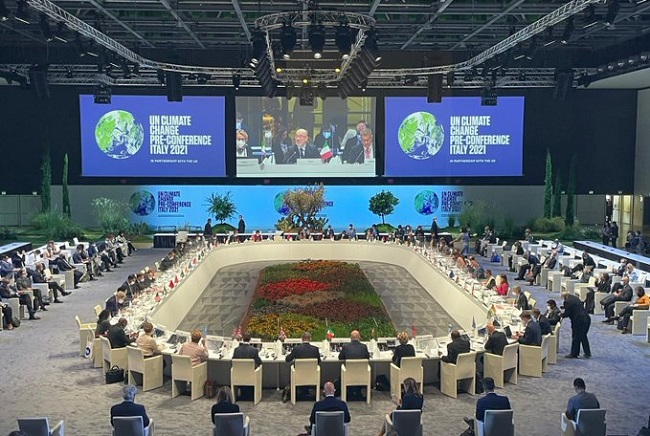The participants of the preparatory conference for COP26 expect that all outstanding points of the Paris Agreement can be resolved, even as the preparations that are now necessary are to be made for this.

At the meeting, Germany’s State Secretary for the Environment, Jochen Flasbarth, called on the industrialised countries to close the remaining gap in annual climate finance for poorer countries.
Attended by from civil society and the UNFCCC, the preparatory conference for this year’s World Climate Conference took place in Milan, Italy from September 30 to October 2, 2021, where over 40 contracting states exchanged views on the key issues of the upcoming negotiations at a political level.
The world climate conference (COP26) will take place from October 31 to November 12 in Glasgow, Scotland.
Flasbarth said: “The COP26 must send the signal that we are keeping the 1.5-degree upper limit and the other climate targets anchored in the Paris Agreement within reach. The G20 countries that have not yet done this must now Present higher climate protection goals and bolder long-term strategies by COP26. The donor states must show how they intend to fulfil the funding commitment for developing countries of over $100 billion. There is still a gap here. In addition, there is still a gap to significantly increase the proportion for adaptation measures to climate change.”
Even if climate protection efforts have increased in recent years, the world is not yet on target. According to the current NDC synthesis report of the UNFCCC, the climate protection contributions of the states lead to an increase in global greenhouse gas emissions by 16% by 2030 (compared to 2010). This would be accompanied by global warming of around 2.7 degrees by the end of the century.
The OECD recently determined that the industrialised countries had mobilized around $80 billion in annual climate finance for developing countries by 2019 – $100 billion were committed annually. The return of the USA to the negotiating table and the announcements of new, higher climate targets by numerous states at the General Assembly of the United Nations in September show that there has been movement in the international community.
Together with Canadian Environment Minister Jonathan Wilkinson, Environment Secretary Flasbarth is consulting on behalf of COP26 President-elect, Alok Sharma, on how the pledged $100 billion can be mobilised for climate finance. The results should be available by the beginning of COP26.
Flasbarth stated: “I had many conversations in Milan that make me more confident that we will make progress by COP26 on the issue of financial support for climate protection and adaptation in developing countries. In addition to mobilizing financial resources, it is also about fairness, reliability and trust – the most important currencies in global climate policy.”
At the conference in Milan, many countries spoke out in favour of concluding negotiations on international trade in emissions certificates (Article 6 of the Paris Agreement). The ministers formulated the clear expectation that all technical work must now move forward quickly in order to be able to take all outstanding decisions on the conclusion of the Paris climate agreement in Glasgow.
The ministers also expect that the process for the new climate finance target for the period after 2025 can be set up in Glasgow and that the issue of losses and damage from climate change that has already occurred can be adequately addressed.
Parallel to the preparatory conference, almost 400 young people from 186 countries discussed their expectations of climate policy and the outcome of COP26 at Youth4 Climate 2021: Driving Ambition from September 28 to 30. They presented their key demands to the ministers in Milan.
